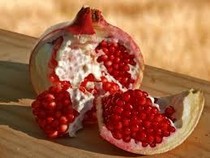More important information in this section about healthy eating:
The surprising benefits of lemon!
An interesting aspect of the lemon is that it has a remarkable effect on cysts and tumors. Some say the lemon is a proven remedy against all types of cancer. It doesn't end there. It has an anti-microbial effect against bacterial infections and fungi; it is effective against internal parasites and worms; it regulates blood pressure, which is too high; it acts as an anti-depressant; it combats stress and nervous disorders. The source of this information, although not specifically named, is one of the largest drug manufacturers in the world. They further say that after more than 20 laboratory tests since 1970, the extracts revealed that it destroys the malignant cells in 12 cancers, including colon, breast, prostate, lung and pancreas and that the compounds of the lemon tree were 10,000 times more effective than the product Adriamycin, which is a drug normally used chemotherapeutically in the world to slow the growth of cancer cells.
Even more, this type of therapy with lemon extract only destroys malignant cancer cells and does not affect healthy cells. As you may know, the lemon tree is known for its varieties of lemons and limes. You can eat the fruit in different ways: you can eat the pulp, juice press, prepare drinks, sorbets, pastries, etc... This plant is a proven remedy against cancers of all types. Some say it is very useful in all variants of cancer. The source of this information is fascinating: it comes from one of the largest drug manufacturers in the world, says that after more than 20 laboratory tests since 1970, the extracts revealed that It destroys the malignant cells in 12 cancers, including colon, breast, prostate, lung and pancreas ...The compounds of this tree showe 10,000 times better than the product Adriamycin, a drug normally used chemotherapeutic in the world, slowing the growth of cancer cells. And what is even more astonishing: this type of therapy with lemon extract only destroys malignant cancer cells and it does not affect healthy cells.
How can you use the whole lemon without waste ? Simple..place the lemon in the freezer section of your refrigerator. Once the lemon is frozen, get your grater, and shred the whole lemon (no need
to peel it) and sprinkle it on top of your foods. Sprinkle it on your vegetable salad, ice cream, soup, noodles, spaghetti sauce, rice, sushi, fish dishes. All of the foods will unexpectedly have a
wonderful taste, something that you may have never tasted before. Most likely, you only think of lemon juice and vitamin C. Not anymore. Now that you've learned this lemon secret, you can use lemon
even in instant cup noodles.What's the major advantage of using the whole lemon other than preventing waste and adding new taste to your dishes?
Well, you see lemon peels contain as much as 5 to 10 times more vitamins than the lemon juice itself. And yes, that's what you've been wasting. But from now on, by following this simple procedure of
freezing the whole lemon, then grating it on top of your dishes, you can consume all of those nutrients and get even healthier.
How To Clean Your Arteries With One Simple Fruit: Pomegranate Found To Prevent Coronary Artery Disease Progression
Article by Sayer Ji, Green Med Info, September 30, 2013
The future of cardiovascular disease prevention and treatment will not be found in your medicine cabinet, rather in your kitchen cupboard or in your back yard growing on a tree. A new study published
in the journal Atherosclerosis confirms that pomegranate extract may prevent and/or reverse the primary pathology associated with cardiac mortality: the progressive thickening of the coronary
arteries caused by the accumulation of fatty materials known as atherosclerosis.
Pomegranate Found To Prevent Coronary Artery Disease Progression
Mice with a genetic susceptibility towards spontaneous coronary artery blockages were given pomegranate extract via their drinking water for two weeks, beginning at three weeks of age. Despite the fact that pomegranate treatment actually increased cholesterol levels associated with very low density lipoprotein-sized particles, the treatment both reduced the size of the atherosclerotic plaques in the aortic sinus (the dilated opening above the aortic valve) and reduced the proportion of coronary arteries with occlusive atherosclerotic plaques.
Remarkably, the researchers also found that pomegranate extract treatment resulted in the following beneficial effects:
- Reduced levels of oxidative stress
- Reduced monocytie chemotactic protein-1, a chemical messenger (chemokine) associated with inflammatory processes within the arteries.
- Reduced lipid accumulation in the heart muscle
- Reduced macrophage infiltration in the heart muscle
- Reduced levels of monocyte chemotactic protein-1 and fibrosis in the myocardium
- Reduced cardiac enlargement
- Reduced ECG abnormalities
How can something as benign and commonplace as a fruit extract reverse so many aspects of coronary artery disease, simultaneously, as evidenced by the study above? The answer may lie in the fact that our ancestors co-evolved with certain foods (fruits in particular) for so long that a lack of adequate quantities of these foods may directly result in deteriorating organ function. Indeed, two-time Nobel Prize winner Linus Pauling argued that vitamin C deficiency is a fundamental cause of cardiovascular disease, owing to the fact that our hominid primate ancestors once had year-round access to fruits, and as a result lost the ability to synthesize it. See Linus Pauling vitamin C lecture on GreenMedTV.
Cranberries and Your Heart
The Remarkable Antioxidant Power of Cranberries
By Phylameana lila Desy Guest article by Brian Williams
Studies have found that cranberries reduce the risk of heart disease. Most recently, a study presented at the annual congress of the International Union of Physiological Sciences in March/April 2005 found that pigs with atherosclerosis (a primary causes of heart disease) that received a daily dose of cranberry powder had restored blood vessel health. Other studies have also found that people who drink cranberry juice have higher levels of good (HDL) cholesterol and may have improved blood vessel function.
Antioxidant Powerhouses
Cranberries are a rich source of antioxidants, according to the Cranberry Institute, a trade association for cranberry growers. In a study funded by the Institute it was found that: "Cranberries contained the most antioxidant phenols compared to 19 commonly eaten fruits. Cranberries are loaded with antioxidants and should be eaten more often," said study author Joe Vinson, Ph.D., research chemist at the University of Scranton in Pennsylvania. Other studies also rank cranberries as leaders in phenolic compound content. "These antioxidants may play a role in helping to prevent heart disease and certain cancers," Vinson said.
Cranberries Fight Cancer
Certain compounds in cranberries have been found to be toxic to many cancer tumor cell lines, including: Lung cancer, Cervical cancer, Prostate cancer, Breast cancer and Leukemia. One study, for instance, published in the June 2004 Journal of Nutrition, found that whole cranberries inhibit prostate, skin, lung and brain cancer cells. Experts believe a compound in the whole cranberry (not just the juice) is responsible for this effect.
Craberries Have Unique "Anti-Adhering" Properties
Whole cranberries can be used in place of other berries in muffins, breads, cereals and more. Cranberries possess a unique ability to inhibit bacteria, including E. coli, from adhering to the urinary tract. This is why cranberry juice is often recommended to prevent urinary tract infections (UTIs). Cranberries also contain hippuric acid, which is antibacterial and helpful for warding off UTIs. But cranberries' anti-adhering properties are helpful for much more than your urinary tract. A study published in the October 2004 issue of the Journal of Science, Food and Agriculture found that an antiviral compound in cranberries called proanthocyanidin A-1 inhibits the herpes virus from attaching to and penetrating the genitals. Likewise, a compound in cranberries is known to keep Helicobacter pylori, the bacteria that causes most gastric ulcers, from adhering to the cells of the stomach lining.
Cranberries and Your Teeth
A study published in Critical Reviews in Food Science and Nutrition in 2002 found that compounds in cranberry juice are great for your oral health. They help to dissolve aggregates formed by many oral bacteria while decreasing the level of Streptococus mutans, the major cause of tooth decay.
The best part about all of this is that cranberries are not, like some health foods, hard to swallow. In fact, they add a unique, tart flavor to all kinds of dishes, including these three recipes for everyone's holiday favorite: cranberry sauce. Enjoy!
Traditional Cranberry Sauce (No Sugar Added!)
Recipe from The World's Healthiest Foods
Ingredients:
1 12oz bag of fresh or frozen cranberries
1 cup fresh orange juice
1 tsp minced fresh ginger
1 tsp minced orange zest
1/4 tsp cinnamon
1/2 cup crushed pineapple
1/2 cup honey
Bring orange juice, ginger, zest and cinnamon to a boil on high heat in a medium saucepan.
Rinse cranberries and add once liquid is boiling. Reduce heat to medium and cook uncovered for about 10 minutes. Add crushed pineapple and honey. Remove from heat and cool.
Spicy Cranberry Sauce
Recipe from The Cranberry Lady
Ingredients:
1 1/2 cups water
1 orange (including juice and finely chopped rind)
2 cups sugar
1 piece stick cinnamon
4 cups fresh or frozen cranberries
Cook first 4 ingredients together for 5 minutes. Add cranberries. Cook until the berries stop popping. Cool without stirring.
Cranberry Chutney
Recipe from the Wisconsin State Cranberry Growers Association
Ingredients:
2 cups chopped Braeburn apple
2 cups whole cranberries
1/4 cup chopped onion
3/4 cup brown sugar
1/2 cup golden raisins
1/2 cup white vinegar
1/2 tsp. chopped garlic
1 medium red pepper chopped
1 Tbsp grated ginger root (or 1 tsp ground ginger)
Combine all in a non-aluminum kettle. Simmer until all fruits and vegetables are tender, about 20-30 minutes. Stir often to prevent scorching.
The anti-aging effects of cucumbers
Article from Natural News by Dr. David Jockers
April 30, 2012
Superfoods are natural foods that have an array of nutrients that synergistically work to together to exponentially expand the individual nutritional components. Many raw, organic vegetables fall into this category. One of the world's favorite superfoods are cucumbers.
Cucumbers are the 4th most cultivated vegetable in the world. Cucumbers are in the same botanical family as melons and squashes. They are considered one of the absolute best foods for the health of the skin, joints, liver, and kidneys. They are also a natural energy tonic with their rich array of phytonutrients and electrolytes.
Cucumbers are loaded with the mineral silica, which is an essential component for healthy connective tissue (muscles, ligaments, cartilage, bone, & skin). It is also full of ionic potassium, magnesium, and vitamin C which give it a powerful alkalizing effect within the body. Additionally, cucumbers are particularly rich in fluids that hydrate the skin, joints, and tissues.
More recently scientists have begun studying the unique lignans found in cucumbers. These lignans include lariciresinol, pinoresinol, and secoisolariciresinol. New research is linking these lignans with reduced risk of cardiovascular disease as well as breast, uterine, ovarian, and prostate cancer.
Cucumbers also contain the triterpene phytonutrients cucurbitacins A, B, C, D, and E. These phytonutrients have been the major focus of some extensive research looking deeply into their abilities to inhibit cancer cell signaling pathways.
Fresh cucumbers have been shown to improve anti-oxidant levels within the body and inhibit pro-inflammatory substances such as COX-2 and nitric oxide. The combination of alkalizing elements, electrolytes, and fluids make it one of the world's best foods for enhancing energy levels. Cucumbers are also great for stabilizing blood pressure and stimulating the body's natural detoxification process.
Cucumbers make for beautiful skin
Cucumbers are often used topically to enhance skin function. The natural ascorbic acid and caffeic acid within the cucumber act to prevent water retention in the skin. This reduces swelling under the eyes and helps the skin heal from sunburn, inflammation, and eczema.
Cucumbers are also very effective when eaten and applied topically for removing unwanted cellulite. Cucumbers act to draw out excess fluids and tighten collagen which has the effect of a natural cellulite reduction. Simply eat some cucumber, juice it, and/or place the cucumber on the regions of water retention.
Cucumbers are typically highly sprayed with pesticides so it is necessary to get organic varieties. If conventional is the only option it is best to scrape off the green skin rather than washing. Many of the chemicals are waxy and do not come off easy with washing.
Try dicing up cucumbers and adding some apple cider vinegar, oregano, and pink salt. This makes a quick, electrolyte and enzyme-rich snack to boost energy levels.







